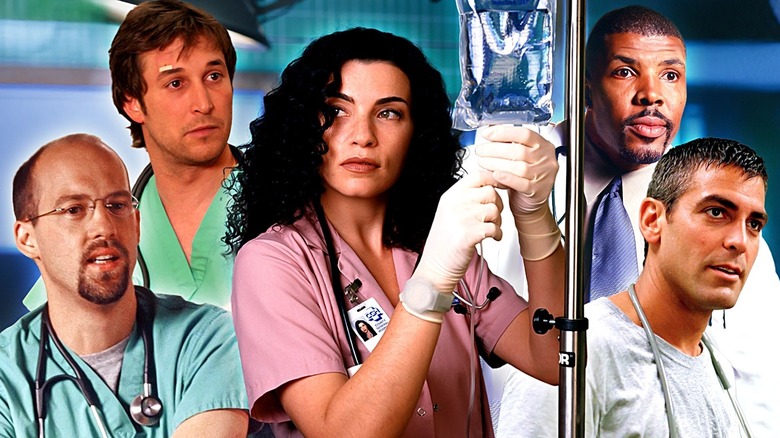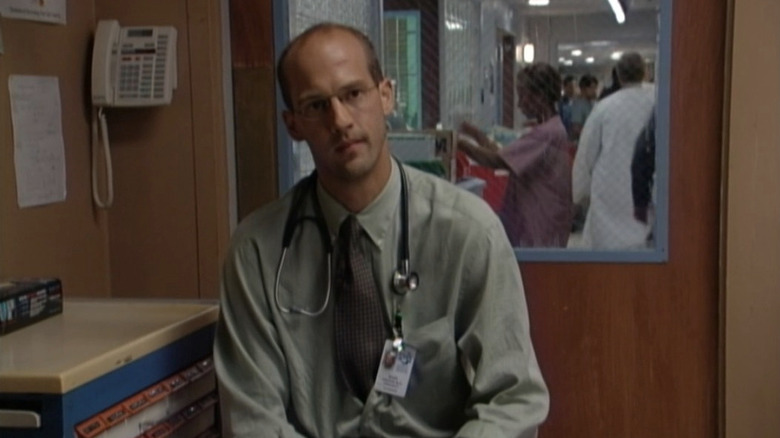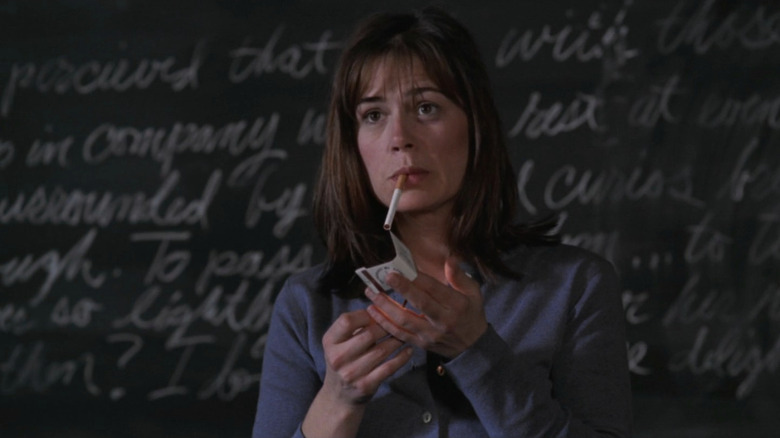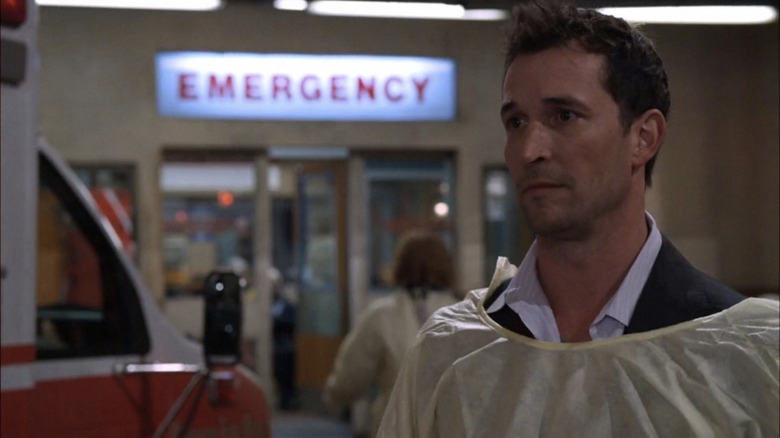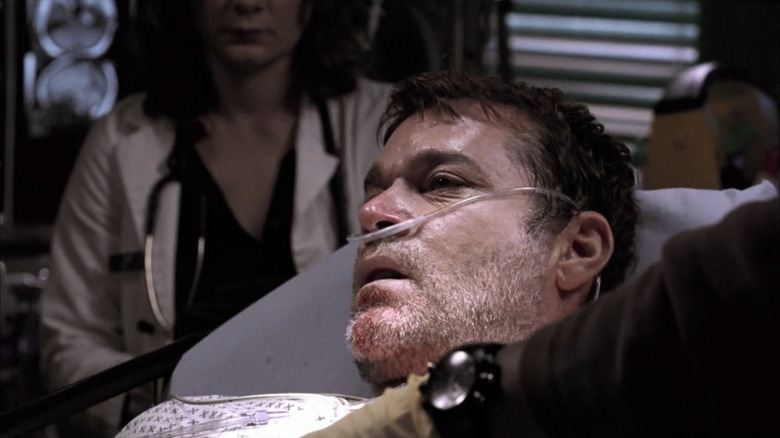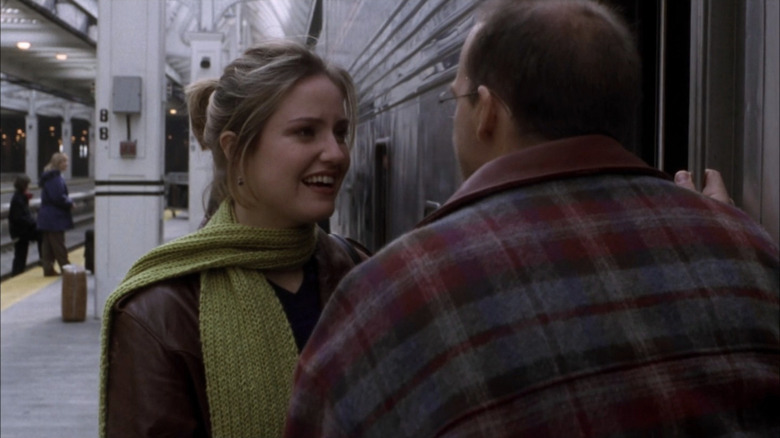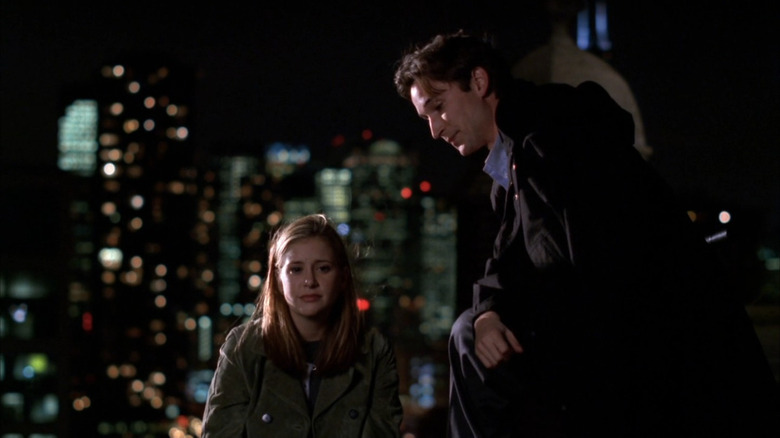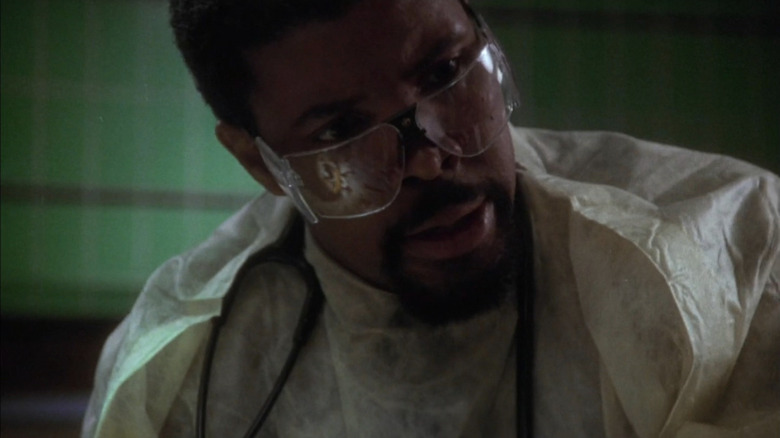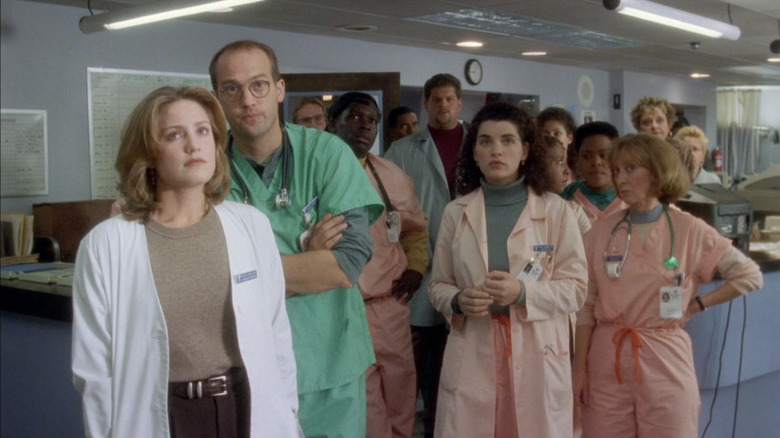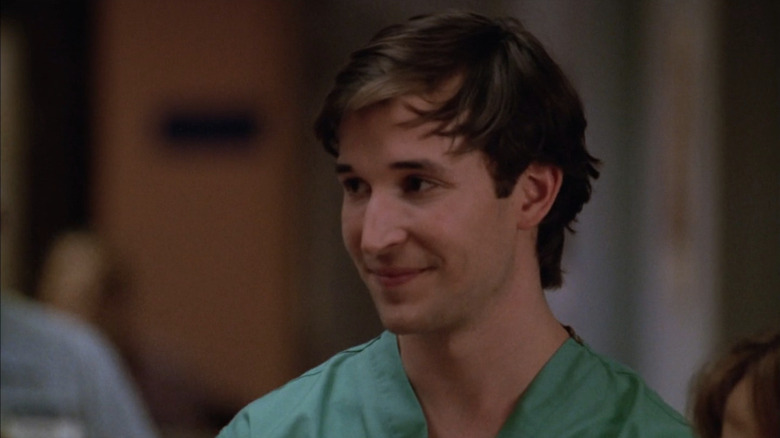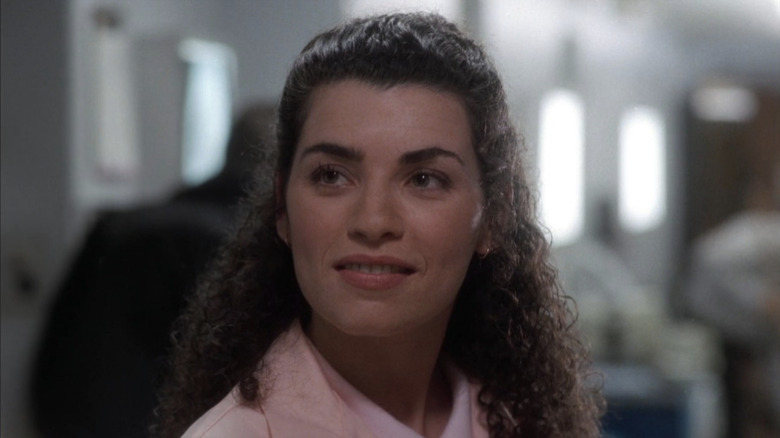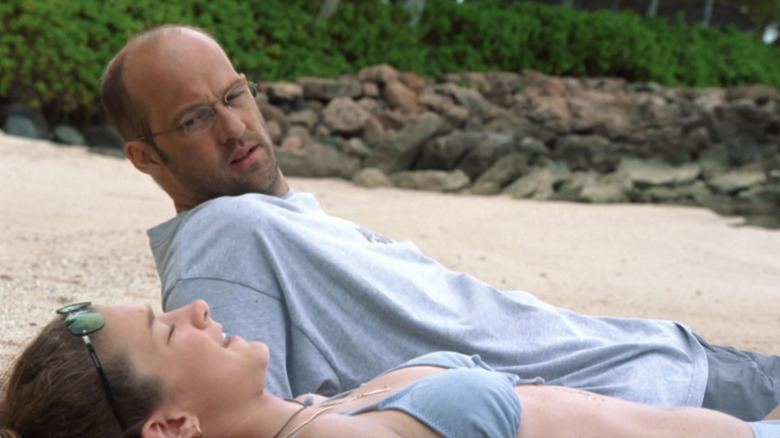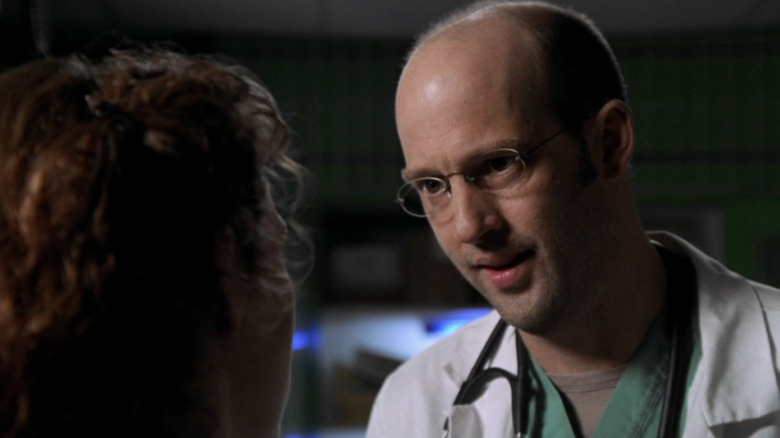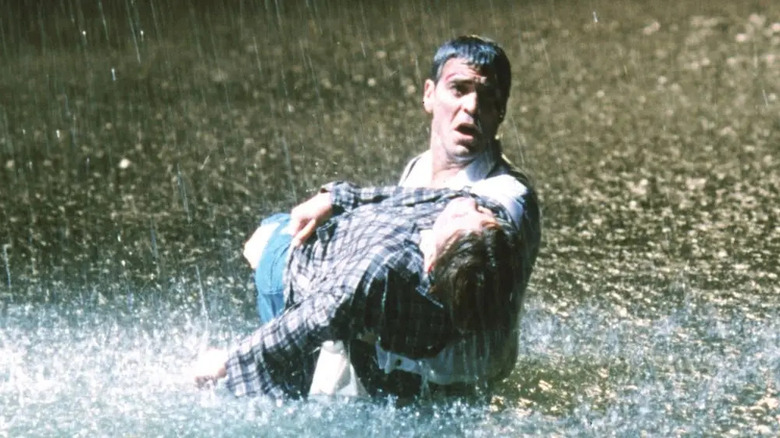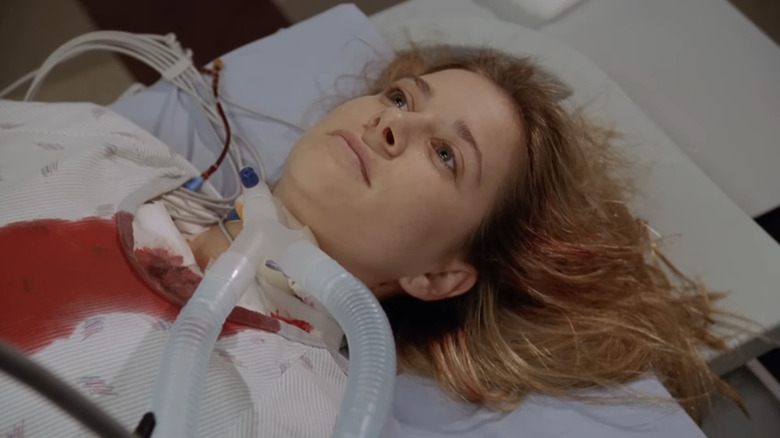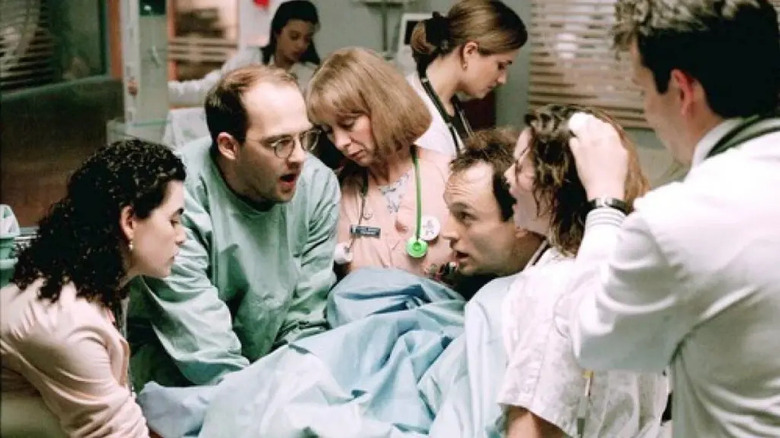The 15 Best Episodes Of ER, Ranked
It's not an exaggeration to say that "ER" is one of the most revered television shows of all time. Considered the gold standard of TV medical dramas, "ER" most certainly paved the way for contemporary medical series such as "Grey's Anatomy," the only such show that boasts more episodes. The recipient of 23 Emmy awards over 15 seasons, "ER" has been equally lauded for its writing, acting, medical accuracy, and high-quality production.
Accolades aside, "ER" leaves an imprint on anyone who watches it, though its popularity has waned in recent years. Thankfully, with the massive success of "The Pitt," produced by "ER" star Noah Wyle alongside Scott Gemmill and John Wells, "ER" has gained a new wave of fans experiencing the show for the first time.
While many "ER" fans prefer the first several seasons, "ER" was always good, even a dozen seasons in, and it was very often great. What follows is a collection of those moments of glory, episodes that exemplify the show at its best: both fast-paced and thoughtful, character and patient-driven, sensible and sentimental, funny and tragic, and always written, performed, and shot like the stakes were life or death.
15. Ambush (season 4, episode 1)
Every department on "ER" was filled with talented folks on both the technical and creative side of things. One of the greatest episodes of the show masterfully combines those two elements to create an unforgettable TV spectacle. In season 4, episode 1, entitled "Ambush," the staff at County General has a pretty average day. Dr. David Morgenstern (William H. Macy) suffers a heart attack. Dr. Elizabeth Corday (Alex Kingston) shows up for her first shift. The fresh-faced John Carter (Noah Wyle) upsets Dr. Mark Greene (Anthony Edwards).
What makes the episode special are the facts of its production: it's a live episode, filmed once for the East Coast and once for the West Coast. Series stars Edwards and George Clooney suggested the idea for the episode, which takes place while a PBS documentary team films a day in the ER. As such, "Ambush" looks different than other episodes, and the meta nature of the documentary positions viewers on the outside of the action for once. The cast and crew pull off the live aspect amazingly well, and while the script isn't one of the show's most compelling, the technical element alone makes this one of the best episodes on the series.
14. Secrets and Lies (season 8, episode 16)
Though "ER" is often discussed in terms of its medical accuracy and powerful emotional impact, it deserves to be remembered for its humor as well. A quasi-bottle episode, "Secrets and Lies," is a lighthearted romp before the somber episodes leading up to Dr. Greene's death. In an homage to "The Breakfast Club," Kerry Weaver (Laura Innes) sends Carter, Susan Lewis (Sherry Stringfield), Abby Lockhart (Maura Tierney), Luka Kovac (Goran Višnjić), and Michael Gallant (Sharif Atkins) to a sexual harassment seminar, and they spend all day fooling around in an empty classroom.
Carter and Susan are dating, as are Abby and Luka, but there's major tension between them that comes out in some pretty hilarious ways, including a literal duel. The episode includes one regrettable moment about Carter losing his virginity at a young age that wouldn't (and shouldn't) air today, but watching the gang (minus Gallant) get their giggles out is as therapeutic for us as it is for them. Episodes like this illustrate that, in many ways, season 8 is one of the best in the series.
13. And In The End... (season 15, episode 22)
How do you wrap up a show that has 15 seasons, dozens of characters, hundreds of guest stars, and millions of fans? You can't please everyone, but the "ER" series finale is one of the best of all time, and it does its best to honor what came before.
What happens in the 331st episode of the show? It's just another day, really. The doctors and nurses tend to their patients, whose ailments vary in intensity, and we're treated to a few sweet callbacks to the pilot. Carter prepares to open his clinic for the underprivileged, and Peter Benton (Eriq La Salle), Kerry, and Susan return to support him. Corday brings Mark's daughter, Rachel (Hallee Hirsh), to town, as she plans to interview for a job at County General.
And that's it. The gang goes their separate ways, and the shift continues. In the final scene, the team suits up for a mass casualty. Rachel, still at the hospital, ushers in the final of the series, as Carter asks her, "Dr. Greene, you comin'?" Life goes on, and the understated "ER" finale reminds us why it's one of the most amazing shows of all time.
12. Time of Death (season 11, episode 6)
The writers of "ER" were always thinking of new ways to represent a day in the life at County General, and these innovations are part of what makes the show so unique. For example, in season 11, episode 6, we follow the last 44 minutes of a patient's life in real time. Ray Liotta, who won an Emmy for his appearance on the show, plays Charlie Metcalf, an alcoholic ex-con who comes in with a stomach ache and never leaves.
Rather than following several patients through one shift, the staff in this bottle episode focuses solely on Charlie, and as we watch the medical team try (and fail) to save his life, we learn more about his history and his painful relationship with his son. Though "ER" had depicted death hundreds of times on the show before this point, Charlie's experience at the hospital provides another perspective. An incredibly moving and relatively quiet episode, "Time of Death" is an underrated powerhouse.
11. Union Station (season 3, episode 8)
"ER" succeeds because of how it brilliantly balances the narrative tensions of a hospital drama. The show always strived for medical accuracy, portraying serious, real-life issues, but it also delved into the personal lives of the doctors and nurses, toeing the line between realism and melodrama. In the episode "Union Station," the series dips into melodrama, cleverly deploying a romantic trope without losing the series' grounded tone.
The day's hospital issues include Doug Ross' (Clooney) encounter with a homeless teen played by Kirsten Dunst, and Carol Hathaway's (Julianna Margulies) fight with the administration over the treatment of nurses. Susan's last day at County serves as the episode's emotional fulcrum, as she and Mark try and work out if they're more than just friends.
We discover the answer in dramatic fashion, as Mark follows Susan to Union Station to declare his love for her. She rejects him, but sticks her head out the window as the train leaves the station to tell Mark she loves him too. The cliché somehow works here, as Springfield and Edwards nail the playful moment without overselling it.
10. The Good Fight (season 5, episode 8)
Though we sometimes follow the doctors and nurses outside of the hospital, much of the action on "ER" takes place within the halls of County General. In the season 5 episode "The Good Fight," we follow doctors both inside and outside of the hospital as they search for a way to save a patient. Carter and Lucy Knight (Kellie Martin) take the case of a young girl involved in a car accident. The team discovers she has a rare blood type and needs a transfusion, but her father, who brought her in, has fled the hospital.
Carter and Lucy are both sent home after a long shift, but neither maintains a good work/life balance, so they head into the city in search of the missing father, repairing their dysfunctional teacher/student relationship in the process. The episode's compelling narrative structure keeps viewers on the edge of their seats as they cross their fingers that Carter and Lucy can find him in time. In typical "ER" fashion, we're delivered a swift dose of heartbreak as it appears Carter and Lucy are too late -– the girl's organs are already shutting down.
9. Night Shift (season 3, episode 11)
Everything "Grey's Anatomy" did, "ER" did first, and better. That's an exaggeration, of course, but many "ER" episodes bear this out. Take the season 3 episode "Night Shift." Illustrating the show's incredible writing, the episode takes a nuanced look at boss/employee relations by following the dynamics between every character in the hospital. Benton (Eriq La Salle) has been mercilessly berating his intern, Gant (Omar Epps), all season. When Benton and Carter work on a patient hit by the L train, they're shocked to discover the man's identity.
"Grey's" fans will recognize this brutal twist, which mirrors its season 5 finale, but as with everything, "ER" uses the twist to usher in thoughtful storytelling. In the following episode, "Post Portem," Benton is forced to reckon with how he treats people and work through his complicated relationship with Carter. It's a great episode for the always-controversial Benton, whose relationship with Carter is one of the most complex on "ER."
8. Blizzard (season 1, episode 10)
Almost every season of "ER" includes a Christmas and/or snow-themed episode, and many of them are fan favorites. The first season of the show starts out strong with "Blizzard," which serves as both a holiday episode and the first of the series' exciting disaster episodes. The episode starts on a lighthearted tone, as Mark and Susan put a cast on Carter's leg as a practical joke, and nurse Wendy (Vanessa Marquez) rides around on roller blades.
The eerie quiet of the hospital is interrupted by a massive highway accident that brings dozens of patients to County General's doors. The understaffed crew works on the patients as best they can, but not everyone can be saved. "Blizzard" exemplifies the show's uncanny ability to fill a frenzied hour of television with quirky character moments alongside compelling supporting players and dynamic action. Directed by veteran filmmaker Mimi Leder, the episode also features particularly well-done blocking and camera work that highlight the hospital's hectic pace.
7. Exodus (season 4, episode 15)
The season 4 episode "Exodus" delivers heart-pounding intrigue in the form of a chemical spill and serves as a huge character-building exercise for a fan favorite. When victims of a chemical spill arrive at County General, Kerry passes out, and Doug and Carol get trapped in an elevator, leaving Carter, still an intern, as the most senior doctor in the hospital. Carter proves he's more than capable of being a leader, stepping up to the plate and implementing the emergency procedures needed to save the day.
Corday, on a parademic ride-along at the site of the spill, gets plenty of action herself, as do Doug and Carol, who are trying to save the life of a little girl running out of oxygen. But this is Carter's episode, and it's deeply satisfying to watch a character who began as a fresh-faced youngster (and to be fair, still looks pretty fresh-faced) become a real grown-up before our very eyes. In classic "ER" fashion, "Exodus" conjures up the perfect balance between self-contained action and series-long character growth.
6. 24 Hours (season 1, episode 1)
One of the greatest TV pilots in history, the first episode of "ER" grabs hold of the viewer and doesn't let them go for 90 minutes. In the first half of the episode, which takes place over 24 hours at County General, we're introduced to the characters we'll come to know and love. Mark sprints through a typically chaotic day and turns down an offer to work at a private practice. Doug flirts with Carol. Carter has his first day on the job, and Susan tells it like it is to her patients.
It's an excellent 45 minutes of medical TV, but at the halfway mark, the episode flips on its head. Paramedics bring in a suicidal patient who has overdosed on pills, and we discover it's Carol, the charming, good-spirited nurse we've just spent the episode getting to know. The doctors and nurses can't believe their eyes, and the intensity ratchets up a notch as they wait to see if she'll wake up. The masterful pilot shows audiences what "ER" is about and why they should watch it. Generating that riveting combination of fast-paced medical drama interlaced with personal issues that spill into the workplace is what "ER" does best.
5. On the Beach (season 8, episode 21)
Every death depicted on "ER" is affecting, whether it's a patient we've just met or a character we've watched for multiple seasons. But few deaths in TV history are as moving as the death of Dr. Mark Greene from brain cancer in season 8. Mark lives longer than expected following his diagnosis, but eventually, there's nothing left to do but prepare for death. Mark travels to Hawaii with Elizabeth, their baby daughter, and his surly teenager, Rachel, to live out his final days.
Mark spends much of his time trying to repair his relationship with Rachel and make up for lost time, though she's not often receptive to his efforts. As one of the wisest characters on the show, Mark accepts that he's dying, and even accepts that he never fully reconciles with his daughter. Few death-centric episodes of television function like this one, in which time passes slowly and undramatically, letting the viewer sit with Mark's gradual death without interruption or forced sentimentality. The result is nothing short of transcendent, earning every tear audiences shed over Dr. Greene's passing.
4. Orion in the Sky
While the "ER" episode portraying Mark's death is one of the most sob-worthy moments on television, Mark's departure from medicine is just as moving, if not more so. In "Orion in the Sky," we watch Mark realize that he can no longer practice medicine in his condition. Mark finds his coordination has been affected by the tumor, though he initially keeps working. Finally, after watching one of his terminally ill patients have a similar experience, Mark realizes he's come to the end of the line.
He decides to stop taking chemo, though Elizabeth protests. He never says a final goodbye to any of his colleagues, who don't realize he's leaving for good. Only the perceptive Kerry understands that he's made his decision. In a callback to the pilot, when Dr. Morgenstern says the same thing, Mark tells Carter, "You set the tone." He then tells Kerry, "Never let work become your life." The episode is "ER" at its best, rendering life-or-death dilemmas with a light touch and avoiding corny clichés. Mark's quiet sendoff is befitting of a character who always puts the work first.
3. Hell and High Water (season 2, episode 7)
Though "ER" never needed dramatic set pieces to tell a captivating story, the moments when it dives into heart-pounding action always deliver. Take the season 2 episode "Hell and High Water," one of the most popular episodes in "ER" history. In this Doug-centric episode, everyone's favorite playboy doctor plans to leave the ER after learning his contract won't be renewed. But first, he has to go and be a hero.
Driving to pick up his rich girlfriend, Doug pulls over to help a boy whose brother is trapped in a storm drain. He spends the rest of the episode trying to free the kid, Ben (Erik von Detten), and prevent him from dying of hypothermia. A news camera crew captures Doug's rescue efforts, and he becomes a television hero while the staff at County General work to save Ben's life.
Doug's hero moment was a big deal for George Clooney, who, after that episode, officially became the movie star we now know him to be. The attention Clooney garnered was well-deserved, as his impassioned performance anchors the entire episode.
2. Be Still My Heart / All In The Family (season 6, episode 13 and 4)
George Clooney's star-making turn in "Hell and High Water" is certainly a memorable "ER" moment, but it's not the show's most impressive foray into high-octane thrills. That distinction goes to a two-part episode in season 6, which sees two main characters fighting for their lives. In "Be Still My Heart," directed by "ER" star Laura Innes, a schizophrenic patient played by David Krumholtz stabs Carter and Lucy in a cliffhanger ending.
In the following episode, we watch the other doctors discover the attack and try to save their co-workers' lives. Carter lives (though he develops an addiction to painkillers), but Lucy tragically dies. Her death is one of the most harrowing in the series. We watch Kerry's hands shake as she intubates Lucy, silencing her for good. We see the abject fear in Lucy's eyes as she watches the medical procedures being done to her, knowing her chances of survival aren't good. The episode is a tour de force of incredible acting, directing, and brilliant camera work, and there will never be anything like it again.
1. Love's Labor Lost (season 1, episode 19)
"Love's Labor Lost" is widely considered the greatest episode of "ER," and we're not going to argue with that. Though it follows a standard "ER" structure, tracking a day of cases at County General, it stands out due to an incredible performance by the reliably brilliant (but underrated) Anthony Edwards and decisive direction from "ER" stalwart Mimi Leder.
What starts as a routine diagnosis of a bladder infection rapidly gets out of hand when Mark's pregnant patient returns to the hospital with violent seizures. Mark realizes the woman is suffering from eclampsia, and with no one from obstetrics available, he tries to deliver the baby himself. Mark's decision has tragic consequences as complications arise with no end, and Mark, despite his best intentions, can't do anything to save her.
When Mark tells the woman's husband, played by Bradley Whitford, that his child was born but his wife died, the devastation is visceral. But so is the entire episode, which never lets us look away from the shocking body horror as the day's other cases fall out of frame. It's a reminder that while birth and death are inevitable parts of the ER, the humanity of both doctors and patients can never be taken out of the equation.
